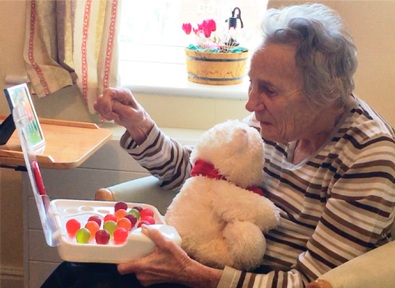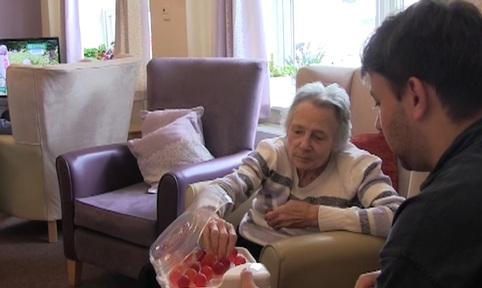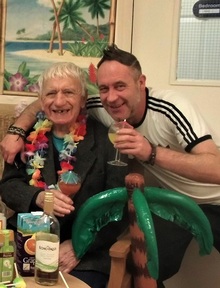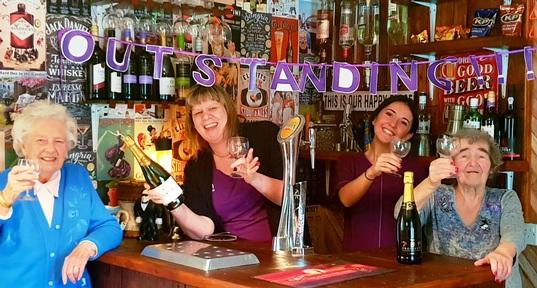Graduate invents Jelly Drops to keep dementia residents hydrated
A JustGiving page has raised more than £5,000 to help a design engineer graduate launch 'Jelly Drops' into care homes across the UK.

As part of his degree, Lewis Hornby created the bite-sized edible pods of water to help residents stay hydrated - a problem which affects one in five elderly people living in care homes.
He became inspired to create the dementia-friendly product after his grandmother was unexpectedly rushed to hospital with severe dehydration.
The Imperial College London graduate said: "Over a year ago my grandma was suddenly rushed to hospital. Thankfully, after 24 hours on IV fluids she was back to her normal happy self and is still enjoying a good quality of life to this day.
“Unfortunately for the 850,000 people in the UK with dementia, this isn't uncommon, and many aren't as lucky as my grandma Pat."
In August last year, Mr Hornby took matters into his own hands to ensure his grandmother and other residents like her could get the fluids they needed. He educated himself on the issue by using sensory deprivation tools and virtual reality, reaching out to a dementia psychologist, spending a week living in a dementia care home, and speaking to doctors about how to create a product that could be eaten easily and provide hydration.
Using what he learned, he created Jelly Drops, which come in six bright colours with associated flavours, presented in packaging reminiscent of a box of chocolates.
The teardrop-shaped treats are composed of 90 per cent water along with gelling agents and electrolytes. The pods are easier to handle and ingest than a glass of water, and take longer for the body to break down, increasing absorption.
'People with dementia find eating easier than drinking'
For people with dementia the confusion and sleepiness caused by dehydration is often mistakenly attributed to their underlying condition, meaning it can often go unnoticed until it becomes life-threatening.
According to Alzheimer's Society, there are a variety of reasons why people with dementia stop drinking; they may no longer feel thirst, may not equate drinking with quenching thirst, may not recognise a cup for what it is, or may not have the dexterity to use a cup. What's more, they often do not understand instructions to drink, and may refuse to be assisted.

“By observing the behaviours of the care home residents I found many were far more independent when it came to eating, and tended to find it more intuitive to use their hands," said Mr Hornby.
"Even still, when presented with a plate of food most would struggle to tackle it unaided. It was a different story however when I got a box of chocolates out. Residents that were otherwise disengaged with their environment would ‘light up’ and gratefully accept a treat when offered, with many taking multiple.
“So when I first offered the Jelly Drops to grandma, she ate seven in 10 minutes, the equivalent to a cup full of water - something that would usually take hours and require much more assistance!"
Jelly Drops has already won multiple design awards, including the Dyson School of Design Engineering DESIRE Award for Social Impact and the Helen Hamlyn Centre Design Award — Snowdon Award for Disability.
To donate on the JustGiving page, go to: https://www.justgiving.com/crowdfunding/caron-sprake
Latest Innovative Care News
 13-May-19
'Pink drink' brain cancer treatment rolled out across NHS in memory of Baroness Jowell
13-May-19
'Pink drink' brain cancer treatment rolled out across NHS in memory of Baroness Jowell
 25-Apr-19
Louis Tomlinson helps 83-year-old who lost wife to dementia complete bucket list
25-Apr-19
Louis Tomlinson helps 83-year-old who lost wife to dementia complete bucket list
 22-Mar-19
UK's top care home handyman takes residents to pub for pie and pint
22-Mar-19
UK's top care home handyman takes residents to pub for pie and pint
 12-Feb-19
Michael McIntyre's jokes tested to see if they stop elderly catching flu
12-Feb-19
Michael McIntyre's jokes tested to see if they stop elderly catching flu
 07-Jan-19
'We were lucky to find it': Family's delight as care home is rated Outstanding
07-Jan-19
'We were lucky to find it': Family's delight as care home is rated Outstanding